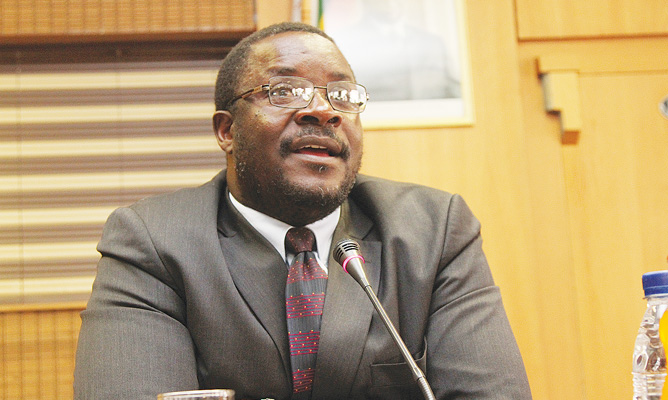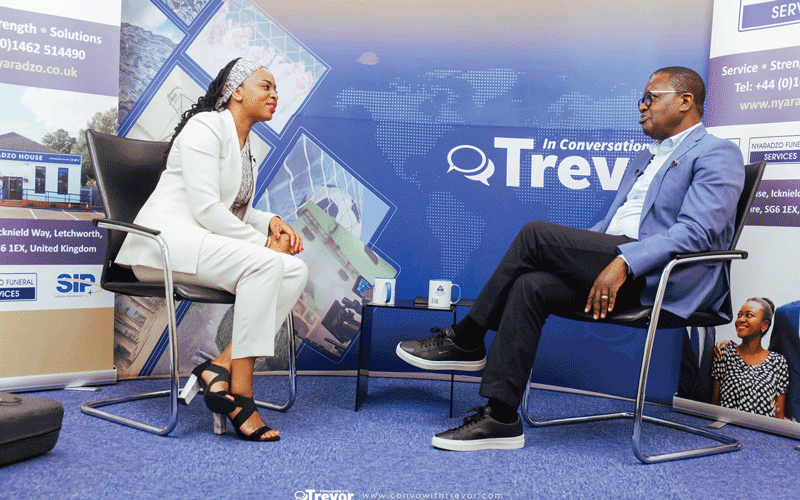
President Emmerson Mnangagwa arrived back home from a five-day state visit to China yesterday amid optimism that his campaign to woo investors is paying off. Mnangagwa met Chinese president Xi Jinping and business leaders from the Asian economic giant, as well as companies that expressed keen interest to invest in Zimbabwe. However, some critics back home were not happy with Mnangagwa’s large entourage.
They were also sceptical about the “mega deals” signed by the two countries, saying it was a repeat of former president Robert Mugabe’s modus operandi. Our reporter Obey Manayiti (OM) asked presidential spokesperson George Charamba (GC) to explain benefits of the trip and other controversial issues that arose during the visit.
Below are excerpts from the interview.
OM: Critics have accused President Emmerson Mnangagwa of repeating former president Robert Mugabe’s mistake of embarking on fruitless foreign trips. They say Mnangagwa’s foreign trips are now too many. What is your reaction to that?
GC: He embarked on courtesy calls in the region. Outside that he then went to Rwanda to sign a continental free trade agreement of the AU [African Union]. Then he went to Cote d’Ivoire to drum up support for investment because it was a CEOs forum.
This time around he has gone to China, a country whose outbound investment capital is put at $300 billion.
When you take away courtesy calls, you find there is a very clear strategy, very clear method to situate Zimbabwe in the Sadc context and to find the resources for his mantra of Zimbabwe is open for business.
The focus must remain on what follows from that effort. The president is also carrying forward his commitment to re-engage with the world so he is motivating FDI (foreign direct investment) and breaking the isolation of Zimbabwe.
- Chamisa under fire over US$120K donation
- Mavhunga puts DeMbare into Chibuku quarterfinals
- Pension funds bet on Cabora Bassa oilfields
- Councils defy govt fire tender directive
Keep Reading
When you look at these areas, even his most tried critics are hard placed to say which trip was not useful and it is a bit unfair to draw simplistic analogy between the former president and the execution by the current president of a plan, which is meant to get Zimbabwe out of the rut.
OM: Since 2014, there have been a lot of mega deals signed between Zimbabwe and China, but according to critics, there is nothing tangible taking place on the ground to show for it.
GC: That is a fair comment from a people, a nation that has been turned despondent with the previous dispensation.
That is a fair comment, but except you need to look at the current effort against three considerations, which are happening back at home.
Firstly, we are drumming up for external support in an environment where Zimbabwe has turned into pro-business.
This means that the negative environment that existed from November 3 is now changing.
This is why you notice, without travel of the president, we have calls of businesses that are trooping to Zimbabwe simply because of that change of environment.
The second factor has to do with reforms initiated by the government.
I have described the November 3 conduct of government as arthritic, nothing happened and we were labouring under a giant seizure of inertia.
There was no activity in bureaucracy and decisions were not being taken, let alone being implemented not even within time frames.
You noticed that soon after taking over, a key ingredient of the present leader’s strategy has been to break that inertia because as investors came in or as you got out to drum up for investment, the make-or-break consideration is the readiness of the intercession structure to play host to those investments and this new tempo will then mark a difference between what happened between November 3 and what happens henceforth.
Let me give you a simple example that happened yesterday [Friday]. We had a meeting with a company mining chrome at Selous and that company wants to develop a steel plant arguably the largest on the continent. This is on the strength of the resource endowment of Zimbabwe, but that investor has been knocking at various ministerial doors from as far back as four years ago.
OM: So, it’s true that at some point investors were shunning Zimbabwe, including China, over bureaucratic inertia?
GC: That is the point that I am making that the state of affairs was arthritic/anthracical.
When you talk about investors, it’s neither European nor Chinese. We are talking about a person who wants to bring in capital and geography doesn’t matter.
That investment that was supposed to give us a steel plant, by the way this is a Chinese investment, was put on hold.
After being given assurances that he would get all the raw materials and the power [coal] to set up his steel plant, the president said should you have any difficulties with any of my ministers please come and report to my office.
I am raising these matters because you can see a new evolving ethos, which is meant to break that inertia that was to stop those deals from being a reality on paper and not on the ground.
Quite a number of Chinese investors spoke of a litany of frustrations they were facing.
The third component that was happening in the country is the crackdown on corruption.
Corruption was affecting the ease of doing business, the cost of doing business before you even factor in archaic laws and bureaucratic sloppiness and when you factor in those three, you will realise that Zimbabwe is another country in which case you can’t judge it on the face of the previous dispensation or cynicism that arose from there.
OM: Would you describe the recent China trip by the president as successful?
GC: I would actually look for a more superlative term to describe that trip because successful is an understatement and I will explain why.
China took a decision to upgrade its relations with Zimbabwe to a comprehensive strategic partner.
This is an upgrading of economic relations to pave way for capital and investment, loans and grants by way of support.
You will also take into account technology and skills transfer. We have now seen for the first time a redefinition of relations between Zimbabwe and China in the direction of a market base, not that of political solidarity only.
The second aspect is that the conferment of a comprehensive strategic partnership with Zimbabwe means Zimbabwe now enjoys a preferred status with the second largest economy in the world and with that kind of status, it is very difficult to regard Zimbabwe as still isolated.
The third aspect has to do with market access. The Chinese said you have had your land reform programme, but land does not trade internationally, it is a national asset and what trades are agricultural products from the use of that land so we are opening our agricultural markets to your own produces beyond tobacco.
They were very insistent that they want fruits from Zimbabwe and they are ready to help us up production on our land so that we can supply them.
It means we can now do contract farming around specific crops for supply to the huge Chinese market.
The last point, which is close the hearts of Zimbabweans, has to do with money.
Two things happened on that trip and China said they are now delinking our debts, meaning all along the language was that until you service your debts we will not give you loans, but there is now that delinkage and the issue of getting loans is now independent of our indebtedness.
To that end, we are looking at getting a billion from the Chinese and this is over and above direct cash injection by way of grants.
These are really measurable concrete deliverables from that trip.
OM: There are complaints over the size of the delegation and some faces who appeared on that trip.
GC: I don’t know who did that census. That trip was a result of a joint commission between China and Zimbabwe.
It focused on energy development, infrastructure development, finance, investment and tourism — five key sectors of our economy — and these and China were interacting and that meant we needed many ministers and officials to have full comprehension of the work to be done.
We had people who went before the president, the second batch of people travelling on their own who are basically the businesspeople and the president’s delegation.
When you look at the needs of this country and what we wanted to accomplish, you will begin to appreciate the need for the delegation that was there.
I think we must avoid simplistic judgements. You can have your president staying at home with consequences and a person who travels with tangible inflows, which will allow us to retool and transform our economy.
OM: Let’s talk about the planned meeting between Mugabe and Mnangagwa. We understand it has been dragging for long, when is it finally happening?
GC: The meeting between the former president and the current one has been a matter between two characters.
To our surprise, we saw this issue becoming a matter for political debate but also an issue of a political structure reportedly linked to the former president. It was also an issue of G40 people in exile who fear a meeting between the former president and his successor.
In their calculation, which is rather foolish, they want to appropriate the symbolism of Mugabe and use it to relaunch themselves politically, therefore, they don’t want any meeting to take place.
The current president made a second overture to the former president just before he left for Abidjan and before the meeting could take place, another ruse was invented and it was supposedly an invasion and break-in at Mazowe where computers were allegedly stolen.
The idea was to spoil the atmosphere for the meeting. Now they are talking about a break-in at Zimbabwe House, except that someone is not telling the country that the former president still holds the keys for that house.
The current president hasn’t set foot at Zimbabwe House, but how do you keep the keys to the property when there is someone who must come in?
OM: So you mean this might have been stage-managed?
GC: I doubt, therefore, that the incidents are real. The idea is to make sure that the meetings don’t take place. They are also abusing him because of old age.
There is also something that is so provocative that happened just before Mnangagwa was supposed to leave for China: the G40 cabal tried to make the former president go to China the same day that the president left.
The ostensible reason was that he wanted to buy tiles for his house.
They were going to leave for China and then Singapore for a genuine medical check-up.
Originally, the president was supposed to visit Singapore as well, but there were budgetary constraints.
This means the G40 cabal had planned to have the two leaders in China and Singapore at the same time and how would you expect to manage the two leaders in the same country at the same time?
As it stands, there are no reasons to make the two leaders go to same countries at the same time.
In fact, the former president is leaving for Singapore today for a medical check-up.
They also wanted him to travel to Equatorial Guinea with the hope that the country might fund their political activities, but the Equatorial Guinea government refused. There is a real push to create a situation of conflict between the former president and Mnangagwa for selfish gain.
Unfortunately, in their naivety, the G40 people don’t realise they are hiding in a desert and at an appropriate time and in an appropriate environment, the two leaders will meet.










